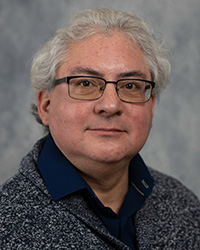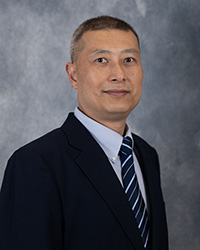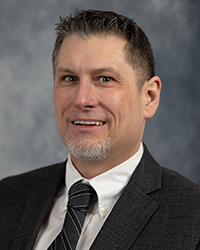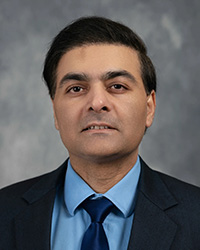Computer Science Research Opportunities
Getting involved in research as an undergraduate student is a powerful way to enhance your academic experience. By collaborating with faculty on cutting-edge projects, you'll gain hands-on experience, develop essential skills like problem-solving and data analysis, and build connections that can shape your future career.
Whether you're looking to explore new technologies, contribute to groundbreaking discoveries, or prepare for graduate school, research opportunities in our department will help you grow academically and professionally.
Explore the diverse areas of research being conducted within our department and discover how you can get involved in exciting projects that push the boundaries of computer science.
Current research opportunities
Dr. Razi Iqbal
My research merges IoT with LLMs to tackle real-world challenges. I am working on creating ways to manage massive IoT data streams from traffic networks or medical sensors for fast, reliable smart systems. I am also studying trust and bias in LLMs to make AI fairer and more transparent. In healthcare, I am exploring LLM applications to enhance diagnostics and personalize treatments. I am excited to guide students in building LLMs from scratch, giving you a chance to create your own AI models from the ground up. Join my team to get hands-on with IoT, LLMs, and data analysis, working on projects that could change lives. Undergraduates can start small, while graduate students can dive into big challenges, possibly co-authoring papers.
Dr. Patrick Kinnicutt

My research interests involve scientific computing, spatiotemporal data analysis, and educational computing. I am currently collaborating with Interventive Learning to develop an application incorporating artificial intelligence (AI) for K-12 math and English education. I am also looking at machine learning to aid in the automation of physical movements.
Dr. Qi Liao

My primary research interests lie at the intersection of computer security, artificial intelligence (AI) and machine learning (ML), visual analytics, and the economics/game theory of network usage and cybersecurity. As our reliance on AI continues to grow, the trustworthiness of these systems remains largely uncertain. Recently, my work has focused on adversarial AI/ML, exploring how attackers may exploit AI models and visualization tools to launch cyberattacks or uncover system vulnerabilities. For a list of recent publications and research projects, please visit my publication webpage.
Dr. Patrick Seeling

How will humans and machines collaborate with one another and with each other in the future? The answer to this question necessitates a comprehensive approach that integrates human-centric communication, ultra-low latency, adaptive intelligence, and sustainable data processing. My research integrates concepts from networking, human-machine interaction, robotics, and artificial intelligence (AI)/machine learning (ML) to engineer environments that facilitate seamless human-human, human-machine, and machine-machine interactions in both real and virtual spaces, such as the next generation metaverse supported by 6G technologies. This research re-evaluates some of the foundational theories in networking and computer science, established by Shannon ("information capacity is limited"), Landauer ("information is physical"), Turing ("non-computability in digital worlds"), and Einstein ("information speed is limited"). For instance, enabling interactions with humans and machines that are distant in real time—such as remote surgery or robotic control in industrial settings—requires concepts such as negative latency. The negative latency concept integrates human-machine interaction and AI/ML to overcome the physical limitations of networks.
Feel free to contact me directly to discuss industry collaborations as well as for undergraduate and graduate student projects and research/thesis opportunities.
Computer science capstone research projects
Turning knowledge into real-world impact
Your senior year isn't just about finishing strong, it's about applying everything you've learned in a real-world setting that sets you up for success after graduation. In Computer Science, every student takes part in a Capstone Project that brings together classroom knowledge, technical skills, and team collaboration.
Real projects, real clients, and real experience
In this two-semester, team-based course, you’ll work on a comprehensive project that mirrors the kind of work you'll face in your future career. Projects are often sponsored by real companies, from tech startups to global engineering firms, and are guided by practicing professionals who mentor you along the way.
- Computer Science students develop mid- to large-scale full-stack software applications using advanced software engineering concepts. Many projects include collaboration with corporate sponsors, giving you insight into industry workflows and expectations.
- Engineering students tackle multidisciplinary design challenges, creating physical prototypes for industries like automotive, construction, process, and utilities.
This is more than just a class, it's your chance to take ownership of a complex problem, collaborate with a team, and deliver a solution that meets the standards of industry professionals.
What you’ll gain
- Hands-on experience: Apply your skills in a real-world context and work directly with industry mentors.
- Team collaboration: Learn how to thrive in a multidisciplinary team, just like in the workplace.
- Professional preparation: Develop communication, presentation, and project management skills that will set you apart.
- Portfolio-ready work: Walk away with a completed project you can showcase to potential employers.
The Senior Design Expo
It all comes together at the Senior Design Expo, a public showcase where you and your team present your finished project. This isn’t just about showing off what you’ve built (though that’s definitely part of it). It’s about explaining your process, demonstrating your skills, and sharing your passion with industry reps, faculty, and the campus community.
Why it matters
Capstone Projects at CMU are more than just a graduation requirement—they’re a launchpad for your career. Employers look for graduates with practical experience, the ability to work in teams, and the confidence to present complex ideas clearly. That’s exactly what you’ll gain, and demonstrate, through your capstone experience.

